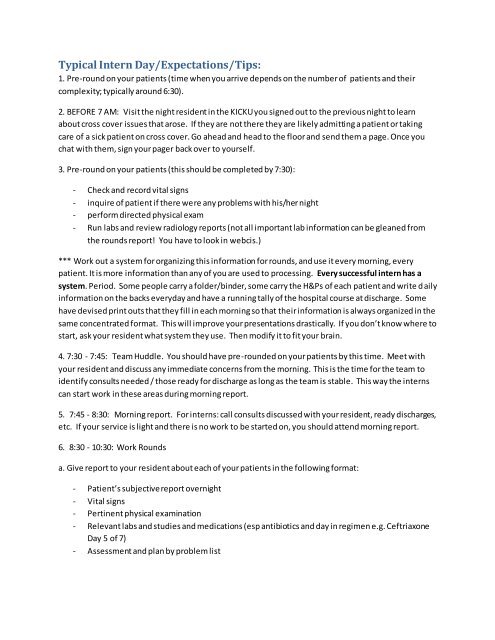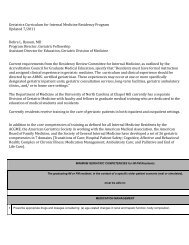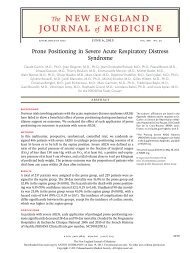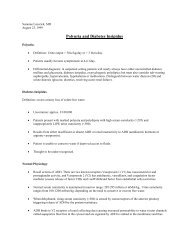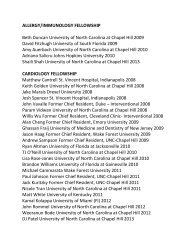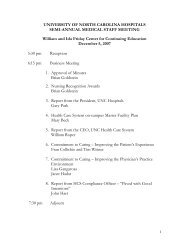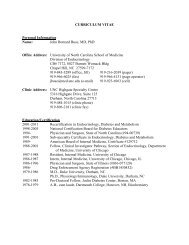Intern Survival Guide 2013-14 - the UNC Department of Medicine
Intern Survival Guide 2013-14 - the UNC Department of Medicine
Intern Survival Guide 2013-14 - the UNC Department of Medicine
Create successful ePaper yourself
Turn your PDF publications into a flip-book with our unique Google optimized e-Paper software.
Typical <strong>Intern</strong> Day/Expectations/Tips:1. Pre-round on your patients (time when you arrive depends on <strong>the</strong> number <strong>of</strong> patients and <strong>the</strong>ircomplexity; typically around 6:30).2. BEFORE 7 AM: Visit <strong>the</strong> night resident in <strong>the</strong> KICKU you signed out to <strong>the</strong> previous night to learnabout cross cover issues that arose. If <strong>the</strong>y are not <strong>the</strong>re <strong>the</strong>y are likely admitting a patient or takingcare <strong>of</strong> a sick patient on cross cover. Go ahead and head to <strong>the</strong> floor and send <strong>the</strong>m a page. Once youchat with <strong>the</strong>m, sign your pager back over to yourself.3. Pre-round on your patients (this should be completed by 7:30):- Check and record vital signs- inquire <strong>of</strong> patient if <strong>the</strong>re were any problems with his/her night- perform directed physical exam- Run labs and review radiology reports (not all important lab information can be gleaned from<strong>the</strong> rounds report! You have to look in webcis.)*** Work out a system for organizing this information for rounds, and use it every morning, everypatient. It is more information than any <strong>of</strong> you are used to processing. Every successful intern has asystem. Period. Some people carry a folder/binder, some carry <strong>the</strong> H&Ps <strong>of</strong> each patient and write dailyinformation on <strong>the</strong> backs everyday and have a running tally <strong>of</strong> <strong>the</strong> hospital course at discharge. Somehave devised print outs that <strong>the</strong>y fill in each morning so that <strong>the</strong>ir information is always organized in <strong>the</strong>same concentrated format. This will improve your presentations drastically. If you don’t know where tostart, ask your resident what system <strong>the</strong>y use. Then modify it to fit your brain.4. 7:30 - 7:45: Team Huddle. You should have pre-rounded on your patients by this time. Meet withyour resident and discuss any immediate concerns from <strong>the</strong> morning. This is <strong>the</strong> time for <strong>the</strong> team toidentify consults needed / those ready for discharge as long as <strong>the</strong> team is stable. This way <strong>the</strong> internscan start work in <strong>the</strong>se areas during morning report.5. 7:45 - 8:30: Morning report. For interns: call consults discussed with your resident, ready discharges,etc. If your service is light and <strong>the</strong>re is no work to be started on, you should attend morning report.6. 8:30 - 10:30: Work Roundsa. Give report to your resident about each <strong>of</strong> your patients in <strong>the</strong> following format:- Patient’s subjective report overnight- Vital signs- Pertinent physical examination- Relevant labs and studies and medications (esp antibiotics and day in regimen e.g. CeftriaxoneDay 5 <strong>of</strong> 7)- Assessment and plan by problem list


